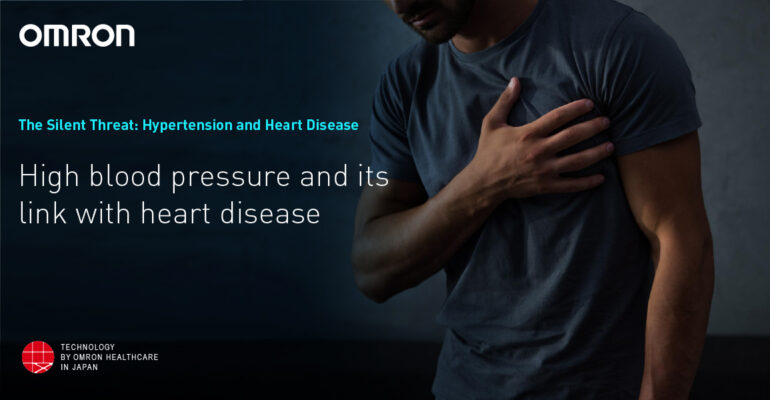High Blood Pressure and Its Link with Heart Disease
February 2, 2023 2023-09-26 14:56High Blood Pressure and Its Link with Heart Disease

High Blood Pressure and Its Link with Heart Disease
Hypertension, also known as high blood pressure, is a medical condition in which the force of blood against the walls of arteries is consistently too high. Normal blood pressure is typically around 120/80 mmHg or lower. However, if the blood pressure consistently measures at or above 130/80 mmHg, it is considered high blood pressure or hypertension.[1]
In India, hypertension is a significant public health concern, with a prevalence of 13.8% in men and 8.8% in women aged 15-49 and 15-54, respectively, according to the Fourth National Family Health Survey. The Global Burden of Diseases study reported that hypertension led to 1.63 million deaths in India in 2016, compared to 0.78 million in 1990.[2]
Hypertension can damage the arteries over a period of time by causing them to narrow and become less elastic, which can lead to plaque buildup in the arteries, further narrowing them and reducing blood flow to organs such as the heart, brain, and kidneys. Over a period of time, this damage can increase the risk of serious health problems such as heart disease, stroke, and kidney disease. In this blog, we will discuss the link between high blood pressure and heart disease in detail.
High Blood Pressure: A Silent Killer
High blood pressure is often referred to as the “silent killer” because it typically does not have any noticeable symptoms. This makes it important to have regular blood pressure screenings and monitoring blood pressure levels to detect the condition early and prevent complications. High blood pressure can be caused by several factors, including genetics, lifestyle factors such as diet and exercise, and underlying health conditions.
The Link Between High Blood Pressure and Heart Disease
Hypertension is a major risk factor for cardiovascular disease, which includes heart disease and stroke. Studies have shown that higher blood pressure is associated with an increased risk of cardiovascular events, such as heart attack and stroke.[3]
When blood pressure is consistently high, it can cause damage to the walls of the arteries. This damage can lead to the formation of plaque, which is a buildup of cholesterol and other substances in the arteries. Over a period of time, the plaque can narrow the arteries and restrict blood flow to the heart. This can increase the risk of heart disease, which is a term used to describe several conditions that affect the heart, including coronary artery disease, heart failure, and arrhythmias.
Coronary artery disease (CAD) is a condition in which the arteries that supply blood to the heart become narrow or blocked due to the buildup of plaque. This can make it difficult for enough blood to reach the heart, especially during physical activity, and can cause chest pain or discomfort, also known as angina. In some cases, the plaque can rupture and form a blood clot, which can completely block the blood flow to the heart and cause a heart attack.[4]
Heart failure is a condition in which the heart cannot pump enough blood to meet the body’s needs. Hypertension is a major risk factor for heart failure, as the force pushing on the walls of the arteries as blood moves through them is too strong. When blood pressure is high, the heart has to work harder to pump blood through the narrowed arteries, which can weaken the heart over time and reduce its ability to pump effectively. This can lead to symptoms such as shortness of breath, fatigue, and swelling in the legs and ankles.[5]
Arrhythmias are abnormal heart rhythms that can be caused by high blood pressure. When the heart is under extra strain, it can cause the electrical signals that regulate the heartbeat to become irregular, which can cause the heart to beat too fast, too slow, or in an irregular pattern. Hypertensive heart disease can manifest as cardiac arrhythmias, including supraventricular and ventricular arrhythmias. In some cases, arrhythmias can cause palpitations, dizziness, or faintness.[6][7]
Hypertension is also a risk factor for other cardiac complications, such as ischemic heart disease (the heart muscle isn’t getting enough blood due to the hardening of the arteries) and left ventricular hypertrophy (thickening of the heart muscle).[8]
It is important to work with a healthcare provider to manage hypertension and reduce the risk of heart failure and other complications. This can include lifestyle changes, such as a healthy diet, regular exercise, and stress management, as well as medication and medical procedures if necessary.[9]
Omron BP monitors are an effective tool for monitoring hypertension. Regular monitoring can help detect hypertension in its early stages. By recording the numbers, an individual can make changes in their lifestyle to keep their blood pressure under control. Omron provides a variety of dependable and simple-to-use home blood pressure monitors for convenient and accurate readings.[10]
Wrap-Up:
The link between high blood pressure and heart disease highlights the importance of controlling blood pressure through lifestyle changes and medication and the importance of regular screenings to detect hypertension early and prevent complications.
Reference:
- https://www.heart.org/en/health-topics/high-blood-pressure/the-facts-about-high-blood-pressure
- https://www.nature.com/articles/s41371-018-0117-3
- https://www.ahajournals.org/doi/full/10.1161/HYPERTENSIONAHA.119.14240
- https://www.heart.org/en/health-topics/consumer-healthcare/what-is-cardiovascular-disease/coronary-artery-disease
- https://www.heart.org/en/health-topics/high-blood-pressure/health-threats-from-high-blood-pressure/how-high-blood-pressure-can-lead-to-heart-failure
- https://www.ahajournals.org/doi/10.1161/CIRCRESAHA.117.311402
- https://pubmed.ncbi.nlm.nih.gov/31472889/
- https://clinicalhypertension.biomedcentral.com/articles/10.1186/s40885-019-0132-x
- https://www.cdc.gov/bloodpressure/prevent.htm
- Exercise: A drug-free approach to lowering high blood pressure – Mayo Clinic






